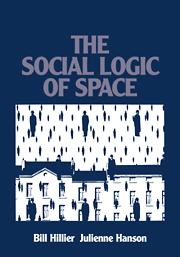Book contents
- Frontmatter
- Contents
- Preface
- Acknowledgements
- Introduction
- 1 The problem of space
- 2 The logic of space
- 3 The analysis of settlement layouts
- 4 Buildings and their genotypes
- 5 The elementary building and its transformations
- 6 The spatial logic of arrangements
- 7 The spatial logic of encounters: a computer-aided thought experiment
- 8 Societies as spatial systems
- Postscript
- Notes
- Index
Postscript
Published online by Cambridge University Press: 18 December 2009
- Frontmatter
- Contents
- Preface
- Acknowledgements
- Introduction
- 1 The problem of space
- 2 The logic of space
- 3 The analysis of settlement layouts
- 4 Buildings and their genotypes
- 5 The elementary building and its transformations
- 6 The spatial logic of arrangements
- 7 The spatial logic of encounters: a computer-aided thought experiment
- 8 Societies as spatial systems
- Postscript
- Notes
- Index
Summary
SUMMARY
The theory, however, sketchy as it is, does permit an outline of a theory of contemporary space which is sketched here and related to basic differences in social formations in the advanced industrial countries. The principal aim of this argument, again, is not to establish a definitive account, but to provide a coherent model for linking together and making sense of the ‘obvious’ phenomena of contemporary space, phenomena which are normally given a simple functionalist or economic explanation. However, modern space is, it is argued, while different in kind, a further instance of the principle that spatial organisation in society is a function of differentiation principles of social solidarities in relation to one another, whether this is a complementary relation or, as now, a class relation.
The social logic of space today
It has been said that the art of mathematical proof lies in finding a framework within which what one wants to say becomes nearly obvious. The same might be said of theories. A good theory should render ‘nearly obvious’ interconnections between observable facts that had previously appeared puzzling or anomalous. What is puzzling about the situation today is why we should have undertaken such extensive revisions to urban and locality structures, when the effects of the new forms of spatial arrangement appear, at best, as no improvement and, at worst, as socially damaging.
- Type
- Chapter
- Information
- The Social Logic of Space , pp. 262 - 268Publisher: Cambridge University PressPrint publication year: 1984



